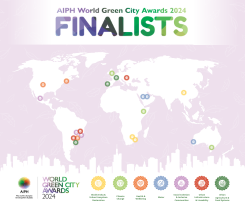
Photo: prerna-bhardwaj-unsplash
Digital twin helps Stuttgart to measure sustainability
06 December 2022
by Christopher Carey
The German city of Stuttgart has teamed up with digital solutions provider Hexagon and tech company Fujitsu to develop a digital twin platform aimed at boosting sustainability.
Using software to visualise data from internet of things (IoT) sensors, the city’s Civil Engineering Office will monitor a diverse range of challenges including water quality, flood levels and parking space occupancy.
“The needs of our residents are very important to us,” said Jens Schumacher, Head of IT, Stuttgart Civil Engineering Office.
“Stuttgart’s Urban Digital Twin project will provide our office with a vast amount of mobility and environmental data, and the IoT analysis platform from Hexagon and Fujitsu will give us the ability to use that data to make smarter decisions for the good of our city.”
The platform is based on Hexagon’s M.App Enterprise, with Fujitsu providing the cloud infrastructure service for the project.
“Stuttgart is an exemplary model of how cities can solve today’s most pressing urban challenges, such as sustainability, safety and mobility, through the use of real-time data analysis,” said Maximillian Weber, Senior Vice President, EMEA, Hexagon’s safety, infrastructure and geospatial division.
“We’re proud to partner with Stuttgart and Fujitsu in putting data to work to ensure a better future for the city.”
Yoshinami Takahashi, EVP and Vice Head of the Global Solution Business Group at Fujitsu, added: “We are excited to grow our partnership with Hexagon to solve the challenges of cities. In collaboration with Hexagon, we will provide a service that enables real-time analysis of environmental data in Stuttgart and contributes to the improvement of services for residents.”
The future?
According to analyst predictions, over 500 urban digital twins are expected to be deployed by 2025 and the technology could save cities US$280 billion by 2030 through more efficient urban planning.
Some municipalities – including Tallinn, Seoul and Des Moines – have launched digital twins while many others are still weighing up the pros and cons and considering their options.
In July, innovation accelerator Connected Places Catapult announced a new board to advance digital twins across the UK, with Dr Alison Vincent chosen as chair of the Digital Twin Hub.
Speaking after her appointment, Dr Vincent said: “Digital twins are already helping to find the best solar panel locations in Singapore, manage people flow at train stations in London, and simulate the impact of natural disasters in Seoul.
“Ultimately, digital twins and connected digital twins will give us a clear advantage in fighting global, systemic challenges like pandemics, climate change and inequality.
“The Digital Twin Hub is a key player in the world of digitisation [and] a vehicle to help the UK digitise at speed.”
Image: prerna-bhardwaj-unsplash










